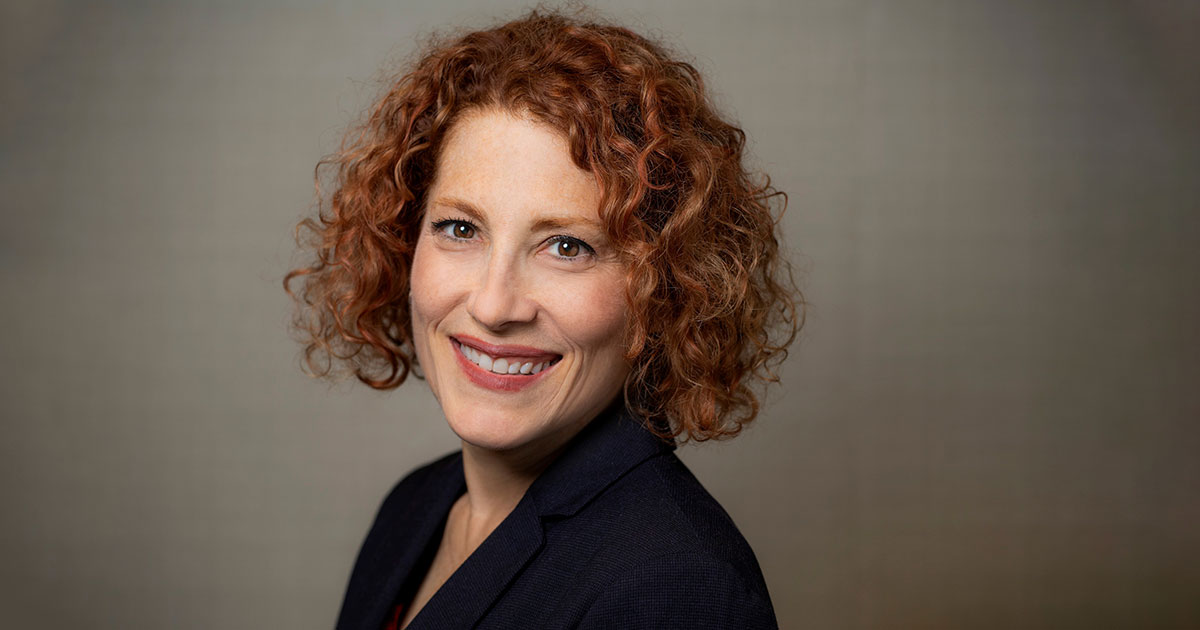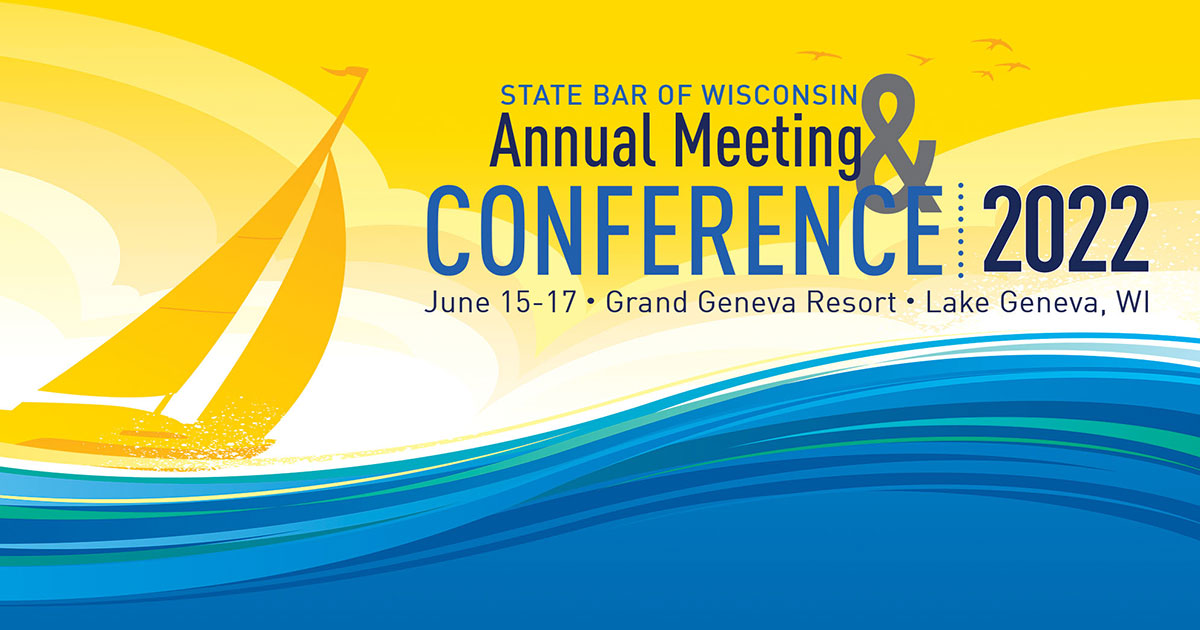
“It’s just not diversity related to identity or experience but diversity of thought, diversity of culture, diversity of approaches to problem solving,” says Dr. Sharon Meit Abrahams, an international legal talent expert. Abrahams is scheduled to give the opening plenary at the State Bar of Wisconsin’s Annual Meeting and Conference (AMC) on Thursday, June 16, 2022.
April 6, 2022 – For Dr. Sharon Meit Abrahams, the argument for making legal workplaces more diverse is straightforward.
“It makes the process smarter,” Abrahams said. “It makes your service to your clients better when you have diverse teams.”
Abrahams, an international legal talent expert, is scheduled to give the opening plenary at the State Bar of Wisconsin’s Annual Meeting and Conference (AMC) on Thursday, June 16, 2022.
Titled “If You Build It They Will Come, and Hopefully Stay,” the plenary will feature a panel discussion about the benefits of building a diverse workforce.
Diversity: Good for Business
Abrahams has spent the last 30 years working with lawyers to help them become more efficient and more profitable.
Abrahams has served as a member of the Professional Development Committee of the American Bar Association’s Law Practice Division. She has also served as chair of the Professional Development Advisory Committee of the Association of Legal Administrators.
Abrahams said that more diverse teams not only work smarter, they also work more profitably. She cited a 2021 report by Credit Suisse that found a positive correlation between gender diversity in corporate leadership and profits.
“The boards that had at least one female on the board had higher returns,” Abrahams said.
Broad Definition is Key
The key to diversity driving smarter and more profitable work, Abrahams said, is employing a broad definition of diversity.
 Jeff M. Brown is a legal writer for the State Bar of Wisconsin, Madison. He can be reached by email or by phone at (608) 250-6126.
Jeff M. Brown is a legal writer for the State Bar of Wisconsin, Madison. He can be reached by email or by phone at (608) 250-6126.
“When we say ‘DEI,’ especially in the context of law, we’re always thinking of racial diversity, and gender diversity, and then LGBTQ, sometimes in that order. But it’s just not diversity related to identity or experience but diversity of thought, diversity of culture, diversity of approaches to problem solving.”
Hiring people from a broad range of identities and backgrounds isn’t enough, Abrahams said – they need to be empowered.
“We also have to remember that inclusivity is important and that the diverse individuals feel that they have a voice. If they don’t feel that they can speak up, it doesn’t serve any purpose.”
Dismantling Groupthink
Abrahams said that diverse teams approach problems from different angles. The result is often a broader range of options for decision makers and less reliance on striving for consensus for consensus’ sake.
“A diverse group – however you want to define diverse – is going to challenge you differently. Diverse people will raise questions from different points of view. Diverse groups will play devil’s advocate. They might reduce groupthink because there’s somebody in the group who’s looking at it through a different lens.”
According to Abrahams, emotional intelligence and social awareness are the keys to hiring a workforce that’s diverse in both identity and background.
“Getting to know people is one of the key pieces of emotional intelligence. And asking those kinds of things – Where do you come from?’ ‘What kind of childhood did you have?’ ‘What kind of schooling did you have?’ ‘What kind of family did you grow up in?’”
‘Different Brainpower to the Table’
Knowing the personality type – whether measured by the Meyers-Briggs inventory or some other measure – of each team member can also be important, Abrahams said.
“You’re going to go by your gut, and somebody else is going to go by their analytical skills. So just think about that at the table, whether it’s a working group, whether it’s a legal team. You’re going to look at things a little differently because you’re going to come at it differently.”
But, again, employers need to make an effort to learn about their employees’ diverse backgrounds and skillsets. Otherwise, they’re dependent on the emotional intelligence of individual employees.
Abrahams, who studied accountancy and business management before getting her doctorate in education, cited her own facility with numbers and her ability to see patterns as an example.
“That’s knowing my emotional intelligence and what I bring to the table,” Abrahams said. “I could say to someone, ‘I have this skill,’ but you won’t know that unless you ask me or I bring it up. If a person has high emotional intelligence, they would ask about skills others might have.”
Abrahams said that inventorying employees’ skillsets and viewpoints is worth the cost, because “diversity brings different brainpower to the table.”
Strategic Approach is Essential
According to Abrahams, the lack of self-awareness exhibited by some lawyers is one barrier to developing emotional intelligence. A lack of motivation is another.
“If you can manage yourself and you know what your motivations are, you can have some social awareness,” Abrahams said. “Think about the lawyers that you know that have no social awareness. They don’t care about other people’s feelings.”
For firms and other legal workplaces seeking to diversify their workforce, a strategic approach is essential, Abrahams said. Without one, efforts like unconscious bias training go only so far.
“If it’s not part of a bigger initiative, just to go off and do the training is a check-the-box activity and not something’s that really making us grow as humans,” Abrahams said.
Even efforts that go deeper will only reach those who are willing to learn, she said.
“By doing unconscious bias trainings and opening the dialogue, you can begin to change people’s thinking – but only the people who want to change.”
How to Start?
Abrahams said that building a more diverse workforce requires employees to overcome a penchant for biases that’s built into the human brain.
“Bias is natural to all humans,” Abrahams said. “It keeps us from picking up the poisonous snake or eating the poisonous berries.”
But the plasticity of the human brain allows for change.
“We can reframe things,” Abrahams said. “We can understand other people’s biases as well.”
One way to begin that reframing process is by reading, Abrahams said.
She mentioned a book by Vernā Meyers, vice-president for inclusion strategy at Netflix, titled “What if I Say the Wrong Thing? 25 Habits for Culturally Effective People.”
“Just buying that book and passing it out to everybody will create some change and some conversation,” Abrahams said.
Seek Out the Stories of Others
She also suggested that lawyers read books by authors “that tell the stories of lives that you don’t have.”
For instance, “Reading Lolita in Tehran,” a memoir by Azar Nafisi about a women’s book club that read works of Western literature forbidden by Iran’s theocratic government.
Imbibing the types of cultural lessons imparted by authors like Nafisi, Abrahams said, can be a vital first step to building a more diverse workforce.
“When you read these types of books you learn about other people’s experience, so when you’re interviewing a Muslim woman who lives in America you understand why she doesn’t give you eye contact.”
The goal isn’t to eliminate biases, Abrahams said, but to acknowledge and then overcome them.
“You still might have that bias, but you understand it and don’t let it affect your decision making about hiring somebody.”
The Solo/Small Firm Approach
How can sole practitioners and small firm lawyers embrace diversity?
“You want to keep in mind diversity of thought when you’re working with clients,” Abrahams said. “Your clients might approach things in a different way than you would approach things.”
For example: A lawyer is proud of a document she drafted for the client and wants the client to read the document. But the client wants the lawyer to read the document to him.
“Don’t get frustrated with your client,” Abrahams said.
Abrahams also said that sole practitioners and small firm lawyers can add to their books of business by branching out to diverse clients.
“If you’re a sole practitioner or a small firm, why don’t you look beyond those who look like you, as clients, and find a niche?”
‘He Learned the Culture’
Abrahams told the story of a white male lawyer she knew who befriended a Chinese couple and helped them with some non-legal tasks.
The couple then hired him for his legal services and later referred him to other members of their community.
“He learned the culture, he learned about what their needs were, and then he got a whole new stream of business because he went beyond his comfort level and explored a diverse culture and was able to support them,” Abrahams said.
Social awareness and emotional intelligence aren’t just for big law firms or multi-practice teams, Abrahams said.
“Look beyond what you normally do. What are the needs in your community? What are the needs just outside your community, if you live in a homogenous community? What’s on the other side? Think about what that could do for your profitability.”
A Long Way to Go
Abrahams said the legal profession is more diverse than it was in the 1990s, when women lawyers at some big firms began organizing retreats.
But the profession still has a long way to go. Abrahams said the start of that journey has been hastened by the onset of the COVID-19 pandemic.
In particular, Abrahams cited the adoption of virtual meeting platforms and investments in technology necessary to enable lawyers to work from home.
The first made it easier for law firms and other legal employers to present and disseminate diversity trainings. The second forced many employers to empower millennial employees to lead innovation – something millennials had long been clamoring for.
“COVID really pushed the buttons of changes that needed to happen,” Abrahams said.
Abrahams is hopeful the panel she’s putting together for AMC will help convince Wisconsin lawyers to continue making those changes. The panel will be made up of an in-house lawyer, a government lawyer, and a legal talent professional.
Ultimately, change must come from within the profession.
“Part of the issue with lawyers is the lack of motivation to change,” Abrahams said. “Behavior change is something I talk about all the time.”
She’ll go on talking about it, confident that the legal profession is headed in the right direction.
“We can build a better workplace when we talk about our biases and help us reframe our thinking about some of the prejudices,” Abrahams said.

Join your colleagues at the State Bar of Wisconsin’s Annual Meeting & Conference (AMC), June 15-17 in Lake Geneva.
AMC will host nationally-renowned plenary presenters – including former U.S. Solicitor General and Wisconsin native Paul Clement – and a variety of continuing legal education (CLE) sessions, helpful practice resources, and plenty of social activities to fill up your time.
Make it a summer to remember at the Grand Geneva Resort & Spa. Savor the scenery, have fun with family, and recharge by drawing from the energy and excitement of the Conference’s special events.
Meet your colleagues at the Grand Geneva in a relaxed, friendly atmosphere, away from the interruptions and stress of the typical workday. Enjoy the summer breeze off the lake, championship golf courses, and a revitalizing spa. Make it a family vacation and bring your kids.
How to Register for the 2022 Annual Meeting & Conference
Register by May 5 to save $50 on your regular registration rate. First-time attendees save $100 off their registration.
For more information about AMC, visit amc.wisbar.org.
To register:
- visit the event page in the WisBar Marketplace;
- call (800) 728-7788;
- download and fax the conference registration form to (608) 250-6020; or
- download and mail the conference registration form to: State Bar of Wisconsin PINNACLE Registrations, P.O. Box 7158, Madison, WI 53707-7158.
